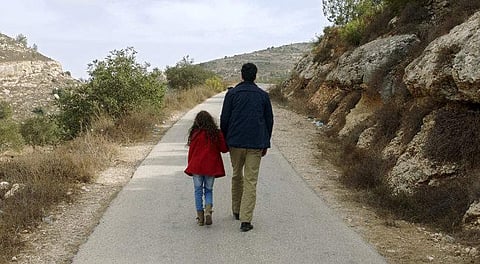The Present Movie Review: A simple yet potent tale of power abuse
Rating:(4 / 5)
Early in The Present, Yusef (Saleh Bakri), on his way back home after a long day at work, has to cross the Checkpoint 300 that separates Bethlehem and Jerusalem. The narrow path is crammed with hundreds of men tussling to make their way through the gateway and Yusef is one among them. The scene abruptly cuts from the dark and uproarious walkway to Yusef's bright and quiet home. The chirps of birds replace the indecipherable tumult. At home, he is not being jostled or jostling others but is laying comfortably. His eyes do not indicate mental peace, though. The simple cut illustrates the contrast between Yusef's life when he is out in the world and when he is in the comfort of his home.
Director: Farah Nabulsi
Cast: Saleh Bakri, Mariam Kanj, Mariam Basha
Streaming On: Netflix
That contrast is relatable to most of us. At some point in our lives, we must have either come across people who do not treat us with the politeness we expect or been to places where basic human decency is too big of a reward. The humiliation that emanates from such tiny moments is the heart of The Present and perhaps this why we deeply sympathise with Yusef, even if the Isreal-Palestine geopolitics, which is the cause of conflict in the film, is a subject that we might not comprehend completely. The story thus works beautifully both on a very personal level as an individual's struggle, and at the macro-level as a representation of tyranny.
With a runtime of 24 minutes, The Present's plot is simple, but both the filmmaker and the viewer know it's not as simple as it appears. The fact that this plot packs in so much commentary is what makes this short special. Yusef plans to gift a refrigerator to his wife on their wedding anniversary and sets out with his young daughter, Yasmine (Maryam Kanj), to carry the present home. What seems to be an undemanding task mounts into a challenge when Israeli soldiers exhibit their authority in front of Yusef, who means no harm. When the soldiers belittle Yusef, the presence of his young daughter, who remains a helpless witness, only adds to the humiliation. During one of the film's lighter moments, Yasmine plays with two birds confined in a cage, and the birds could very well be stand-ins for her and Yusef.
While Today They Took My Son, a 2016 short written by Farah Nabulsi, had a wailing mother contemplating the subsistence of her imprisoned son, The Present reverses the roles, showing us naive Yasmine's point-of-view. Both films, however, have repression at their core. While Today They Took My Son was an explicit portrayal of power abuse with its voice-over, music, and usage of real-life footage, The Present is calm and composed, although it packs an equally powerful punch. The Present’s controlled and subtle narrative, although it’s fuming against authoritarianism inwardly, charts Nabulsi’s growth as a story-teller. For instance, Today They Took My Son, excessively relies on Nabulsi’s voice-over to describe the plight of a generation through the words of a mother. On the other hand, in The Present, Yusef is asked to remove his watch, a possession he inherited from his father, while passing through the security checkpoint. When his father’s watch, that he has carefully preserved for years, goes under the control of the Israeli soldiers for a few moments, it is more than a mere timepiece -- it becomes the reflection of the times Palestine is going through.
When the soldiers once again stop and question Yusef when he is returning with the refrigerator, it’s an uphill battle for him. Interestingly, moments before arriving at the checkpoint, he is pushing the refrigerator up against an inclined hill, thereby making his struggle both physical and psychological.
The Present is an angry film, but it finds a way to channel its anger through story-telling, rather than resorting to the easier route of verbalising the filmmaker's thoughts, thus making it a potent tale of simple people subjected to abuse of authority.

